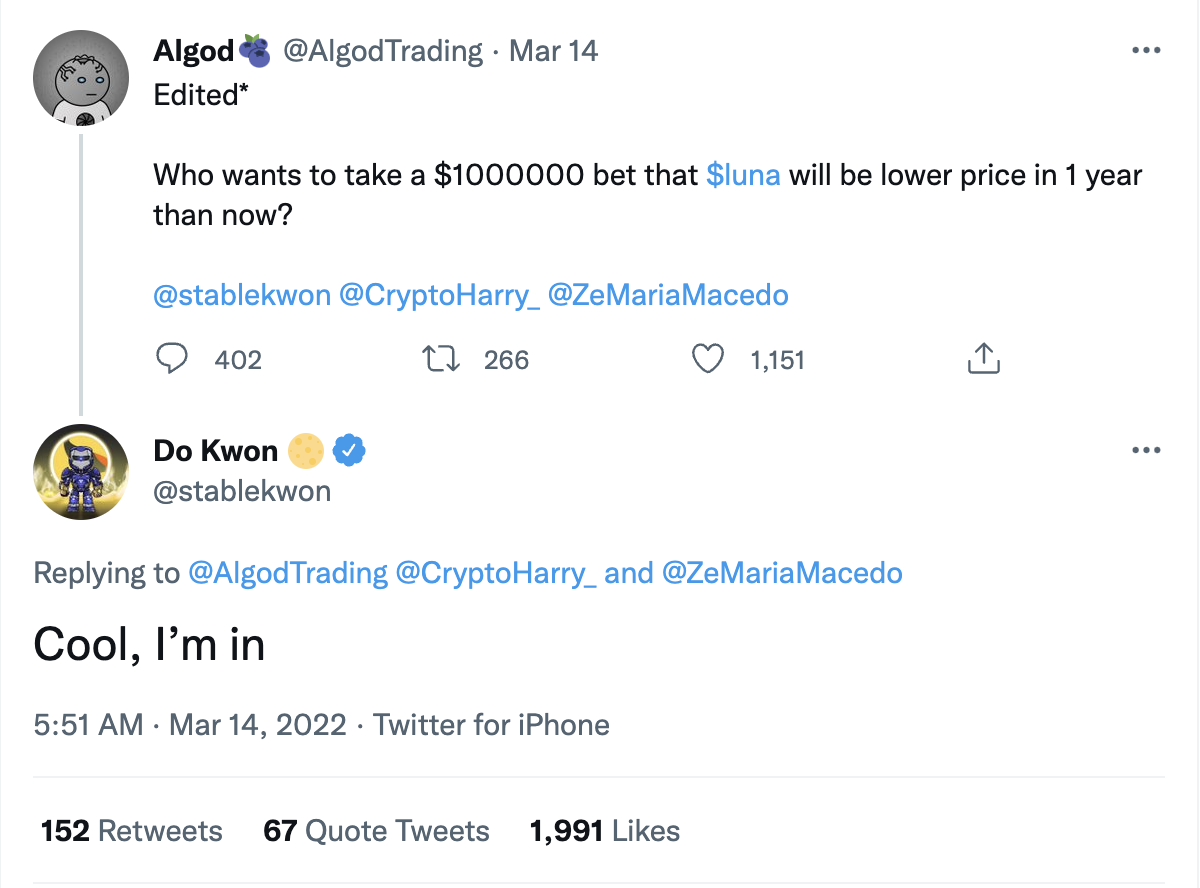Table of Contents
“95% are going to die [coins], but there’s also entertainment in watching companies die too”, Do Kwon sniggered, the mirth visible in his eyes as he waved his hand dismissively. Kwon was responding to a question posed by video streamer Alexandra Botez, who asked him about the sustainability of the vast amount of companies that are entering the crypto space because of how it’s “hot and so much fun”.
Do Kwon: “95% are going to die [coins], but there’s also entertainment in watching companies die too” @stablekwon said this just 8 days ago. $LUNA died one week later. Who’s laughing now? pic.twitter.com/i6kYE5OK1m
— Blockhead (@blockhead_co) May 13, 2022
Eight days after that video was published, Terra’s algorithmic stablecoin UST abruptly de-pegged, LUNA lost 99.99% of its value (literally “dying” overnight), and the video mysteriously vanished, along with the fortunes of thousands of investors. “Entertaining” from an outsider’s point of view, but hardly any “fun” for Terraform Labs, Do Kwon, and the “LUNAtics” – actual lunatics who, for some reason, were stupid enough to place their entire life savings into the hands of an individual who incredulously named his kid after his own cryptocurrency while claiming to be the “Master of Stablecoin” – like a sort of Korean Yoda but for stablecoins.
Read more: RIP LUNA – Stablecoin Dies Less Than a Week After TerraUSD Depegs
I once wrote a piece titled “Terra: To the Luna in 2022”. As I’m writing this article, I’m seriously contemplating if I should permanently (and secretly) remove it from my writer’s profile. Jokes aside, I’ll readily admit that like many others, I focused too much on the utility of the Terra blockchain, without actually realising that the fragility of its “algorithmic” stablecoin (essentially what the entire ecosystem is based on) would eventually lead to the complete demise of a what could have been an extremely effective stablecoin-based payments system.
What I failed to understand and convey is that while algorithmic stablecoins do work on paper, they’re essentially backed by perceived value (in this case, the value of LUNA – a cryptocurrency and not a real-world asset like the dollar), which means that in the extremely volatile and fickle decentralised world where monetary policy is believed to be a thing of the past, a sudden change in sentiment towards the asset could actually result in the collapse of the stablecoin and its ecosystem.
Now that I’ve satisfied my urge to explain crypto as clearly as possible, let’s talk more about Do Kwon, the “master” who clearly did not sufficiently explain the mechanics of an algorithmic stablecoin to LUNA investors, and instead waltzed around crypto Twitter acting like one of those weird and snobbish (but secretly cunning and manipulative) kids diagnosed with ADHD.
While the design of Terra’s stablecoins are flawed, the whole fiasco can and should also be attributed to Do Kwon’s eccentric cockiness – his misogynistic tendency to label his critics as “girls”, his condescending attitude towards crypto skeptics whom he believes are the “poor”, and his recklessness that he readily flaunts though extravagant bets with anonymous Twitter users.

In July last year, Francesca Coppela, a British economist, tweeted that self-correcting mechanisms – such as the kind adopted by UST – will likely fail if large amounts of investors abruptly head for the exit.
Kwon’s reply was brazen, arrogant, and rude: “I don’t debate the poor on Twitter, and sorry I don’t have any change on me for her at the moment.”
On May 9 this year, the day UST lost its peg, Kwon tweeted an oddly dismissive message: “Anon, you could listen to CT (crypto Twitter) influensooors about UST depegging for the 69th time. Or you could remember they’re all now poor, and go for a run instead. Wyd”.
Kwon then followed up with an even weirder message the next day, referencing the “age of men” and even dinosaurs in a tweet about “waiting for the earth to become unstable”.
On the surface, Kwon’s arrogance contributed to the downfall of Terra because he refused to acknowledge the flaws of the Terra ecosystem. But one cannot help but wonder if he genuinely believed in the success of Terra, or perhaps it was all just an elaborate facade to conceal the fact that he deliberately planted the chinks in Terra’s armour.
I’m up – amusing morning
— Do Kwon 🌕 (@stablekwon) May 7, 2022
Anon, you could listen to CT influensooors about UST depegging for the 69th time
Or you could remember they’re all now poor, and go for a run instead
Wyd
CoinDesk has even called Kwon the “Elizabeth Holmes of crypto”, comparing him to the convicted fraudster, and revealing that he was one of the pseudonymous co-founders behind the algorithmic stablecoin Basis Cash – a failed project that had the same mechanisms as UST.
The truth will soon come to light, but this week’s events have exposed how unprepared we are for decentralization because when the shit hits the fan, who can we look to for recourse? Or do we only have ourselves to blame because we’ve only been focused on making quick and easy gains?
So my question to the industry is this: When an individual or an organisation creates something that’s supposedly decentralized, but shirks their responsibilities when they’re no longer able to control the outcomes due to the “decentralization,” then is that really a fairer and more sustainable way of governance?










